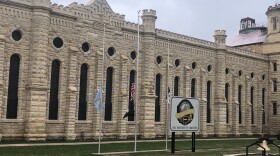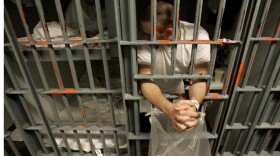Doug and Louise’s loved one is serving a life sentence at the Anamosa State Penitentiary or ASP. In his two decades behind bars, he’s coped by pouring himself into woodworking. His intricate pieces dot their suburban home.
“One is like the Tree of Life. That's all made out of lots of little pieces of different colors of wood,” Doug described. “He’s even got into where he can do inlay work and things like that, which all these skills, he's acquired them at the prison.”
IPR is identifying Doug and Louise by just their middle names because they fear retaliation against their loved one.
Louise says woodworking has kept him sane.
“It was his sanity,” she said, “absolutely his sanity.”
“There's always some things going on that can frustrate you,” Doug added, “So this was his way of putting that energy into something that was constructive rather than being destructive.”
But their loved one hasn’t been able to do any woodworking for months, due to the recent restrictions.
In March, correctional officer Robert McFarland and nurse Lorena Schulte were killed on the job at ASP, allegedly by two inmates. Investigators believe the men used prison-issued hammers as weapons, beating McFarland and Schulte to death during a failed escape attempt.
RN Lorena Schulte and CO Robert McFarland died during an attempted escape attempt from Anamosa State Penitentiary in Iowa. @afscme_c61 is demanding immediate staffing increases and workplace safety reforms to make sure this tragedy is never repeated. https://t.co/NOBtrScN0R pic.twitter.com/OaCzfTtSmy
— AFSCME (@AFSCME) April 9, 2021
In response, officials implemented a slate of changes and restrictions in multiple prisons. Some family members say the harshest are in place at Anamosa, even long after the accused killers were transferred to the Iowa State Penitentiary in Fort Madison.
Louise says she can hear the difference in her loved one’s voice. Always “focused” and “happy-go-lucky”, she says she has never heard him truly complain about prison until now.
“The conversations are definitely different. They're not as upbeat. They're not as happy,” Louise said. “They're just not him. That's all there is to it.”
Loved ones say inmates at ASP feel they’re all being punished for the actions of two individuals and for what they see as the security failures of prison staff.
"People just can't be pushed to the limit like they are without repercussions at some point. I'm trying to avoid an explosion."-Wayne Herman, loved one of an incarcerated Iowan
Wayne Herman is a retired sociology and psychology teacher and pastor who has a loved one at Anamosa.
“People just can't be pushed to the limit like they are without repercussions at some point,” Herman said. “I'm trying to avoid an explosion.”
“Yes, we are 'all' being punished, for what they did … and they aren’t even here any longer!” the inmate wrote to Herman, according to correspondence shared with IPR. “It was a tragedy! I agree with that – as many prisoners do, by their $11,000 donation to the families of the victims. But there were also other factors. There were staff positions open, that were not being filled! Why? There were also some 'procedures' that were not being followed. Why?”
“While 'they' 'try' to 'figure it out,' we suffer – exponentially,” the inmate added.
From me: Incarcerated Iowans have donated more than $11,000 to the families of two prison staffers who investigators say were killed by two inmates at the Anamosa prison in March.
— Kate Payne (@hellokatepayne) May 3, 2021
The amount is significant for people making well below $1 an hour. #Iowahttps://t.co/ZTVay00IAw
Advocates say inmates at ASP are confined to their cells for two-thirds of the day (previously, loved ones said inmates at ASP were generally allowed out of their cells from 6 am to 9 pm). And they say that so many of the things that make life inside bearable are being taken away. The hobby craft area, a prison art studio, is shut down. Access to workout equipment and recreation areas has been scaled back. And the cafeteria is closed, separating friends and forcing inmates to eat in their cells.
Mark Dotson is a formerly incarcerated Iowan who has done time at several Iowa prisons, including at Anamosa. He said the current conditions mean inmates have so little access to friends in other housing units, they “might as well be on the moon."
"You got…the things that make this bearable. Now, what happens when this is gone? When you don't have anything to lose?”-Mark Dotson, formerly incarcerated Iowan
“I promise you, Iowa is not a hard place to do time because people are allowed to kind of have a life. You got your tv, you got your job, you got … the things that make this bearable,” Dotson said. “Now, what happens when this is gone? When you don't have anything to lose?”
Family members say changes to how inmates are classified are disincentivizing good behavior and undermining privileges that long-termers worked for years to earn.
The higher-paying Iowa Prison Industries program at both ASP and the Iowa State Penitentiary has been significantly scaled back, meaning a loss of purpose and the loss of a paycheck for many inmates employed there.
Loved ones say that those who have been allowed back to work at IPI are subject to strip searches that they describe as so invasive, they’re excessive and humiliating.
Housing units at the Mount Pleasant Correctional Facility and the Anamosa State Penitentiary don’t have AC.
— Iowa Public Radio (@IowaPublicRadio) July 29, 2021
Some inmates and their loved ones were complaining about the high temperatures inside facilities even before this week’s excessive heat.https://t.co/tUfuiceHum
Dotson says what worries him most is the heat: housing units at Anamosa, and the Mount Pleasant Correctional Facility, don’t have air conditioning.
“Dealing with the heat and the conditions and what that does to a person's mind … that's the most worrisome,” he said. “When you are so uncomfortable, it's unbearable. And you're trying to … you're just trying to breathe.”
Multiple people IPR spoke with for this story said they fear an increase in violence that could endanger inmates and staff.
"The safety and wellbeing of the staff and the inmates of all of our prisons are the highest priority for this department [...] Once these improvements have been implemented, operations and movement around the facility will return to more normal patterns."-Cord Overton, IDOC spokesperson
Reform advocates and the corrections workers union have long warned of overcrowding and understaffing at the prisons, arguing that declines in state funding are jeopardizing the safety of the facilities.
Herman’s loved one has raised concerns that suicide attempts may increase as well.
“All in all, what purpose or gain, is there, for a person to do the right thing in prison any longer – with all the negative things that have ensued,” he wrote. “The situation just continues to deteriorate anyway. Most are thinking this. Sooner or later, some will respond, in a negative way.”
“I'm just terrified of what could happen,” Herman told IPR. “I think it's fortunate that we have only one incident that I know about so far,” he said, referring to a physical assault on an officer by an inmate in July.
We have received permission from Nurse Lorena's Schulte's family to share memorial fund donation information.
— Iowa Corrections (@IowaCorrections) March 27, 2021
Donations can be sent to:
Lorena Schulte and Robert McFarland Memorial Fund
c/o Fidelity Bank
107 S Garnavillo St.
Anamosa, IA 52205 https://t.co/uSvZ4wsRWV
Since mid-June, 13 officers at ASP have resigned or transferred, according to department spokesperson Cord Overton, though new hires are already filling those openings.
Advocates say they’re speaking out now because they hope to prevent violence by convincing officials to roll back restrictions.
In response to questions from IPR, Overton said new security measures are still being implemented and restrictions will be eased eventually.
“The safety and wellbeing of the staff and the inmates of all of our prisons are the highest priority for this department,” Overton's statement reads in part. “Once these improvements have been implemented, operations and movement around the facility will return to more normal patterns.”
Advocates say that can’t happen soon enough.






